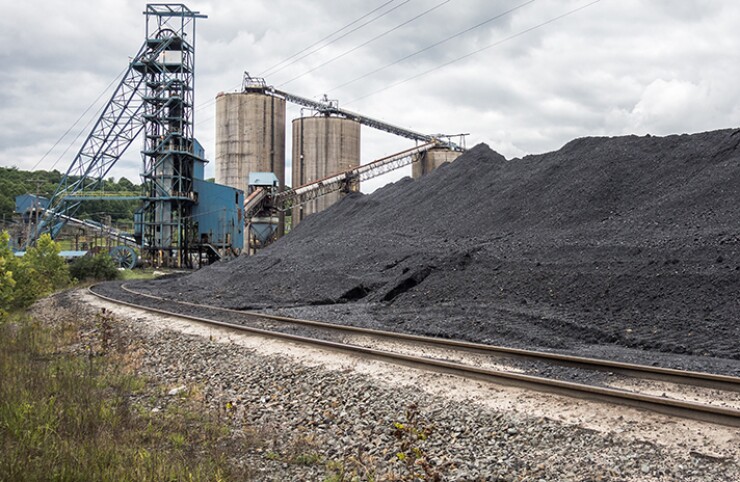War over green: Red vs. blue state fight keeps ESG investing on firing line
8 min read

“Did you ever have to make up your mind? Pick up on one and leave the other one behind?
It’s not often easy, and not often kind.”
The song by the Lovin’ Spoonful could describe the Scylla and Charybdis dilemma banks face during the war between red and blue state government finance officials over environmental, social and governance principles.
AdobeStock
That battle heated up Sunday after it was reported that Bank of America backed off its 2021 pledge to no longer finance the construction of coal mines or drilling in the Arctic.
The bank’s updated environmental and social risk policy statement reversed course on those commitments, according to a report in the New York Times, which said such projects’ financing will instead now be subject to enhanced due diligence.
It comes amid a renewed push during a big election year by conservatives against what they consider progressive policies that have no place in financial markets or public finance decision-making and by liberals who want more government involvement and say in companies’ environmental policies and priorities.
In 2021, Bank of America said it “will not directly finance petroleum exploration or production activities in the Arctic,” due to its uniqueness and “fragile ecosystem.”
That 2021 document included prohibitions on financing thermal coal mines or the expansion of existing mines, financing the manufacture of military-style firearms for non-law enforcement, non-military use and financing private prisons and detention centers.
In its updated December statement, BofA says certain business activities, which carry significantly heightened risks and have increased scrutiny, now are under review.
“Any client relationship or transaction related to the below areas must go through an enhanced due diligence process and be escalated to the senior-most risk review body of the applicable line of business (‘senior-level risk committee’) for decisioning,” the statement says.
“This process is client-specific, deal specific and subject to governance review that considers a range of risks that are evaluated through our risk framework, as are all transaction and client decisions, in the ordinary course of business,” it says.
Some of these areas include
- financing the manufacture of military-style firearms for non-law enforcement, non-military use;
- financing private prisons and detention centers — including companies that provide prisoner and immigrant detention services for U.S. federal and state governments;
- direct financing of petroleum exploration or production activities in the Arctic;
- direct financing of the construction of new coal-fired power plants or expansion of existing — unless those facilities employ technology that is focused on complete or near elimination of atmospheric carbon emissions; and
- direct financing of new thermal coal mines or the expansion of existing mines.
“This is disastrous for the long term. The energy finance transition depends upon the biggest financial institutions doing their part,” New York City Comptroller Brad Lander said in a post on X Sunday. “Bank of America must reverse this decision. Our planet, our economy and our investment portfolios are all at stake.”
The muni market saw $379.992 billion of debt issued in 2023, only $11.076 billion less than the $391.068 billion seen in 2022.
Last week, Lander and trustees of the New York City Employees’ Retirement System (NYCERS), Teachers’ Retirement System (TRS) and Board of Education Retirement System (BERS) filed shareholder proposals requiring banks “to live up to their own rhetoric on achieving net zero implementation plans by fully reporting their ratios of clean energy to fossil fuel finance.”
The three systems filed the proposals with JPMorgan Chase and Morgan Stanley while NYCERS and TRS also filed proposals with BofA, Goldman Sachs, Citigroup and the Royal Bank of Canada.
“Despite all their talk, the big banks have made little progress in the energy finance transition over the past couple of years,” Lander said in a statement.
“As long-term investors exposed to climate risk, we can’t just take their word for it. Reporting transparently on their ratios of clean energy to fossil fuel finance is key to seeing whether or not they are living up to their net-zero commitments,” he said. “Right now, they aren’t — and that must change.”
The resolutions call on the banks to disclose energy-supply financing ratios and report regularly and transparently on whether they are hitting those targets.
Energy-supply finance ratios are an essential metric for fully measuring a bank’s equity and debt financing of both companies and projects, the comptroller said.
The proposals build on the three systems’
The comptroller’s office said as of December the three systems have holdings of 7.17 million shares of Bank of America stock worth $241.31 million; 2.81 million shares of JPMorgan Chase stock valued at $477.51 million; 1.36 million shares of Morgan Stanley valued at $126.81 million; 2.32 million shares of Citigroup valued at $119.46 million; 385.63 thousand shares of Goldman Sachs valued at $148.76 million; and 216.12 thousand shares of Royal Bank of Canada valued at $21.96 million.
This isn’t the first time Lander has called out big financial firms on their ESG policies.
In 2022, Lander told BlackRock CEO Larry Fink to “

AdobeStock
Meanwhile,
While prohibiting the investment of state funds in investments that consider
Some Republicans in the New Hampshire House of Representatives introduced a bill
Violations would be a felony punishable by one to 20 years’ imprisonment. The bill was moved to committee, which voted 13-0 to rule the bill was “inexpedient to legislate,” meaning it’s on hold and unlikely to move ahead in this session.
The bill was put forth by Rep. Mike Belcher with Reps. Sandra Panek and Travis Corcoran as co-sponsors.
“The bill was introduced in order to fix an executive order which, currently, is unenforceable,” Belcher told The Bond Buyer.
“The utilization of ESG criteria in investments, where the expectation is the maximization of gains, represents a form of fraud wherein a portion of gains are purposely forgone in order to leverage the funds towards social and political activism instead,” he said.
“ESG represents the financial engine of radical activism at the heart of so much of our social strife,” Belcher said.
“This bill prohibits the investment of funds of the state treasury, executive branch agencies, and the state retirement system in investments that consider environmental, social and governance (ESG) criteria,” a summary of the text said.
“It requires executive branch agencies to prioritize investment decisions that maximize financial returns and minimize risk, and to review their investments to ensure that no funds are invested with firms that consider ESG criteria,” the bill reads.
The bill would have also required the state retirement system to adhere to its fiduciary obligation and not invest with any firm that considers ESG criteria.
The state treasurer and the New Hampshire retirement system would be required to report annually on compliance, with the duty to make investment decisions based on fiduciary duty, under the legislation.
“Violating the provisions of this bill by investing state or taxpayer funds in a manner that violates fiduciary duty concerning ESG criteria is a felony punishable by imprisonment,” the summary stated.
However, a note attached to the bills pointed out: “the fiscal impact of this bill is indeterminable. Banning investments with ESG-focused firms may affect revenue and incur transition costs if service providers change. The potential exclusion of certain financial institutions may raise costs or miss earnings opportunities, but the specifics are uncertain.”
“Basically, the New Hampshire bill would prohibit the state Department of Treasury, the executive branch agencies and their retirement system from investing state funds in investments which consider ESG criteria,” Pandozzi told The Bond Buyer.
One reasons why the impact may can’t be determined, he said, “is because of the potential for excluding certain financial institutions” that merely “consider ESG criteria as part of their analysis — so it may not be effective in controlling investment costs or cause the state to miss earnings opportunities.”
The bill’s reporting requirement, Pandozzi added, has the potential to duplicate existing requirements. Further, he said, the bill had the possibility of conflicting with other existing laws and executive orders that direct the treasurer to maximize financial benefits for the state.
“My takeaway from reading this bill is that it assumes that all ESG considerations across-the-board are contrary to the goal of maximizing financial benefits,” Pandozzi said. “And because of that sweeping anti-ESG generalization, as noted in the fiscal note, it could cause the state to lose a potentially profitable investment opportunity.”
Other red states have followed Texas’ lead and enacted laws that have led to underwriter bans. Last year, the Oklahoma Treasurer’s Office produced a
In West Virginia, Treasurer
In December, he condemned President Joe Biden’s policies after special climate envoy John Kerry pledged at the 28th United Nations Climate Change Conference (COP28) that the United States would begin a phase-out of all existing coal-based power plants and urged that coal use be eliminated worldwide.
Moore, a long-standing opponent of ESG policies, urged Congress to use its authority to block the international agreements made at the summit.
“At the end of the day, rating agencies, asset managers and banks — all we want them to do is maximize returns,” he told The Bond Buyer in 2022. “We want banks to act like banks, asset managers to act like asset managers — and stay out of politics, which is what they’ve decided to get into with this ESG nonsense.”







